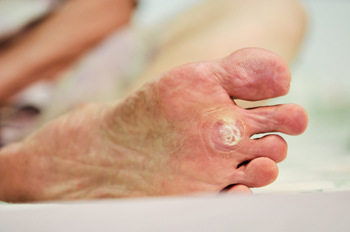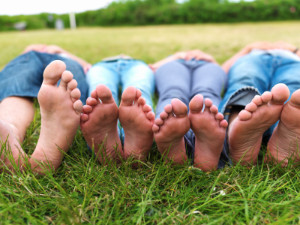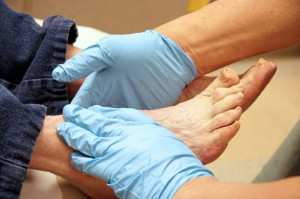Items filtered by date: October 2022
Common Reasons Older Adults Fall

Falls can happen to anyone, but they are far more common among older adults. It is believed that one in four seniors over the age of 65 falls in a year, and the risk of falling increases with age. Among the many causes of falls are dizziness, poor eyesight, slower reflexes, neuropathy, strokes, and other underlying conditions. Certain medications may cause dizziness or drowsiness, which can be factors in losing balance or spatial awareness, especially at night. On a more physical plane, loose rugs and wires, cluttered and darkened hallways, and inadequate lighting may contribute to falls in seniors. A more sedentary lifestyle, which can result in weaker muscle strength, along with balance and gait problems, can also contribute to falls. To find out more about preventing falls, please consult a podiatrist.
Preventing falls among the elderly is very important. If you are older and have fallen or fear that you are prone to falling, consult with Gary Cockrell, DPM from Tennessee. Our doctor will assess your condition and provide you with quality advice and care.
Every 11 seconds, an elderly American is being treated in an emergency room for a fall related injury. Falls are the leading cause of head and hip injuries for those 65 and older. Due to decreases in strength, balance, senses, and lack of awareness, elderly persons are very susceptible to falling. Thankfully, there are a number of things older persons can do to prevent falls.
How to Prevent Falls
Some effective methods that older persons can do to prevent falls include:
- Enrolling in strength and balance exercise program to increase balance and strength
- Periodically having your sight and hearing checked
- Discuss any medications you have with a doctor to see if it increases the risk of falling
- Clearing the house of falling hazards and installing devices like grab bars and railings
- Utilizing a walker or cane
- Wearing shoes that provide good support and cushioning
- Talking to family members about falling and increasing awareness
Falling can be a traumatic and embarrassing experience for elderly persons; this can make them less willing to leave the house, and less willing to talk to someone about their fears of falling. Doing such things, however, will increase the likelihood of tripping or losing one’s balance. Knowing the causes of falling and how to prevent them is the best way to mitigate the risk of serious injury.
If you have any questions, please feel free to contact our offices located in Brentwood and Madison, TN . We offer the newest diagnostic and treatment technologies for all your foot care needs.
Dealing With Plantar Warts

A wart is a growth on the skin that is caused by contact with a virus, namely the human papilloma virus, or HPV. Warts can grow anywhere on the body, but when they are on the feet, they are known as plantar warts. They look a bit like a callus that is growing on the bottom of the foot. Although plantar warts are not generally painful, they can be irritated by pressure on the ball of the foot. Since warts are contagious, it is a good idea not to touch them with bare hands, because the virus easily can spread to another body part. Plantar warts appear as patches of skin with dark spots. When they form as a cluster, they are known as mosaic warts. A plantar wart will likely go away on its own, but that may take some time, even as long as a year. If non-prescription medication is not effective after a few months, or if the wart looks to be infected, it is a good idea to seek medical help. A podiatrist can examine the area and remove the wart by freezing it, applying medication, or in some cases performing surgery.
Plantar warts can be very uncomfortable. If you need your feet checked, contact Gary Cockrell, DPM from Tennessee. Our doctor will assist you with all of your foot and ankle needs.
About Plantar Warts
Plantar warts are the result of HPV, or human papillomavirus, getting into open wounds on the feet. They are mostly found on the heels or balls of the feet.
While plantar warts are generally harmless, those experiencing excessive pain or those suffering from diabetes or a compromised immune system require immediate medical care. Plantar warts are easily diagnosed, usually through scraping off a bit of rough skin or by getting a biopsy.
Symptoms
- Lesions on the bottom of your feet, usually rough and grainy
- Hard or thick callused spots
- Wart seeds, which are small clotted blood vessels that look like little black spots
- Pain, discomfort, or tenderness of your feet when walking or standing
Treatment
- Freezing
- Electric tool removal
- Laser Treatment
- Topical Creams (prescription only)
- Over-the-counter medications
To help prevent developing plantar warts, avoid walking barefoot over abrasive surfaces that can cause cuts or wounds for HPV to get into. Avoiding direct contact with other warts, as well as not picking or rubbing existing warts, can help prevent the further spread of plantar warts. However, if you think you have developed plantar warts, speak to your podiatrist. He or she can diagnose the warts on your feet and recommend the appropriate treatment options.
If you have any questions please feel free to contact our offices located in Brentwood and Madison, TN . We offer the newest diagnostic and treatment technologies for all your foot and ankle needs.
It's Time for Beautiful Feet
Trimming a Child’s Toenails

If you are a parent, then you surely know that trimming your child’s toenails is a critical component of maintaining their overall foot health. However, when the child resists or protests getting their toenails trimmed, the process can be quite difficult. Parents might consider trying to trim their child’s toenails in the bath because this is when their nails are most soft. Additionally, you might even try letting the child see you trim your own nails. Sometimes, children feel uncomfortable when parents trim their toenails because it may seem like a scary procedure to them. However, by letting the child see the parent trim their own nails, the parent might be able to show the child that it is not a scary procedure after all. If you have a child and want to learn more about ways to protect their feet, contact a podiatrist today.
Making sure that your children maintain good foot health is very important as they grow. If you have any questions, contact Gary Cockrell, DPM of Tennessee. Our doctor can provide the care you need to keep you pain-free and on your feet.
Keeping Children's Feet Healthy
Having healthy feet during childhood can help prevent medical problems later in life, namely in the back and legs. As children grow, their feet require different types of care. Here are some things to consider...
Although babies do not walk yet, it is still very important to take care of their feet.
Avoid putting tight shoes or socks on his or her feet.
Allow the baby to stretch and kick his or her feet to feel comfortable.
As a toddler, kids are now on the move and begin to develop differently. At this age, toddlers are getting a feel for walking, so don’t be alarmed if your toddler is unsteady or ‘walks funny’.
As your child gets older, it is important to teach them how to take care of their feet.
Show them proper hygiene to prevent infections such as fungus.
Be watchful for any pain or injury.
Have all injuries checked by a doctor as soon as possible.
Comfortable, protective shoes should always be worn, especially at play.
If you have any questions please feel free to contact our offices located in Brentwood and Madison, TN . We offer the newest diagnostic and treatment technologies for all your foot and ankle needs.
Diabetic Foot Blisters

If you are someone who lives with diabetes, then you ought to know that diabetes can negatively impact the health of your feet. One way in which diabetes does this is by making blisters on the feet more likely. Diabetics may not be able to feel when their shoes do not fit correctly because of diabetic neuropathy, which is damage to the nerves. Therefore, when shoes are ill-fighting and the material is rubbing up against the foot in damaging ways, a diabetic might not be able to feel these sensations. Additionally, people struggling with diabetes might develop blisters on their feet because they may have a condition known as bullous diabeticorum, which makes an individual develop blisters spontaneously. A diabetic ought to take the risk of developing blisters seriously because blisters have the potential to become infected. Schedule an appointment with a podiatrist today if you have diabetes and blisters.
Diabetic foot care is important in preventing foot ailments such as ulcers. If you are suffering from diabetes or have any other concerns about your feet, contact Gary Cockrell, DPM from Tennessee. Our doctor can provide the care you need to keep you pain-free and on your feet.
Diabetic Foot Care
Diabetes affects millions of people every year. The condition can damage blood vessels in many parts of the body, especially the feet. Because of this, taking care of your feet is essential if you have diabetes, and having a podiatrist help monitor your foot health is highly recommended.
The Importance of Caring for Your Feet
- Routinely inspect your feet for bruises or sores.
- Wear socks that fit your feet comfortably.
- Wear comfortable shoes that provide adequate support.
Patients with diabetes should have their doctor monitor their blood levels, as blood sugar levels play such a huge role in diabetic care. Monitoring these levels on a regular basis is highly advised.
It is always best to inform your healthcare professional of any concerns you may have regarding your feet, especially for diabetic patients. Early treatment and routine foot examinations are keys to maintaining proper health, especially because severe complications can arise if proper treatment is not applied.
If you have any questions please feel free to contact our offices located in Brentwood and Madison, TN . We offer the newest diagnostic and treatment technologies for all your foot and ankle needs.


